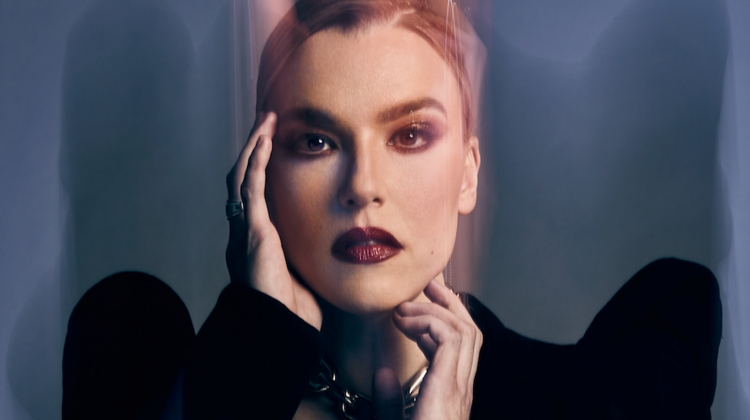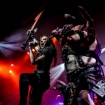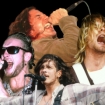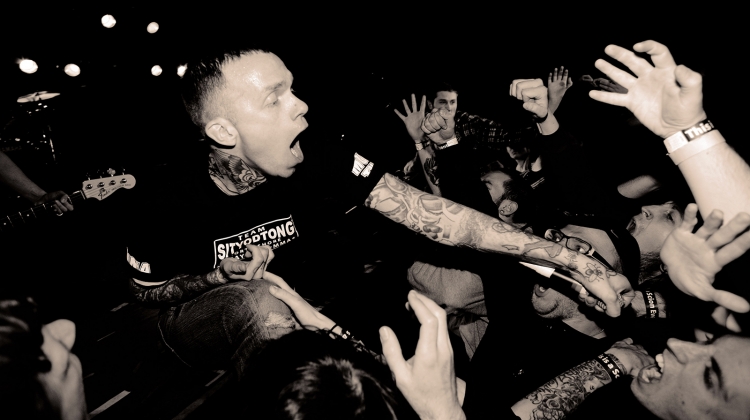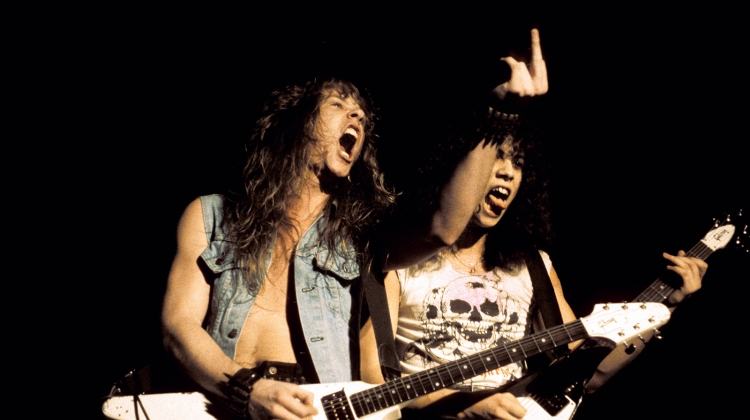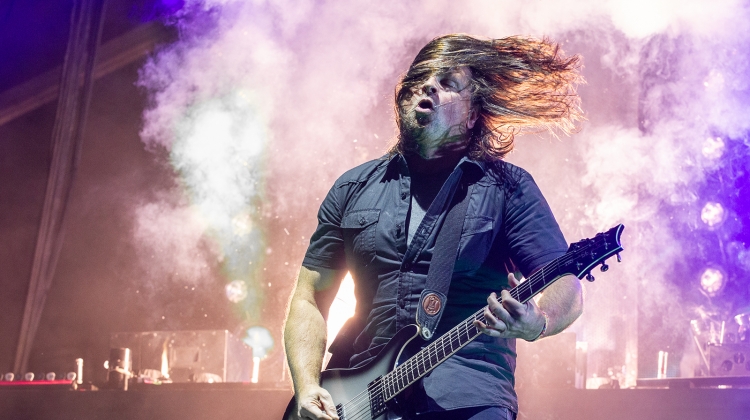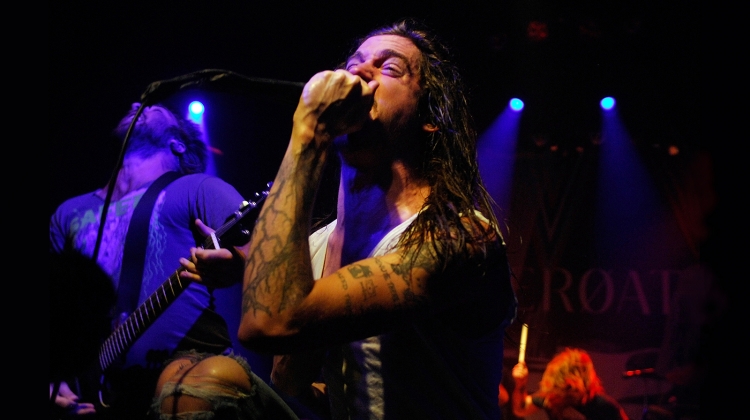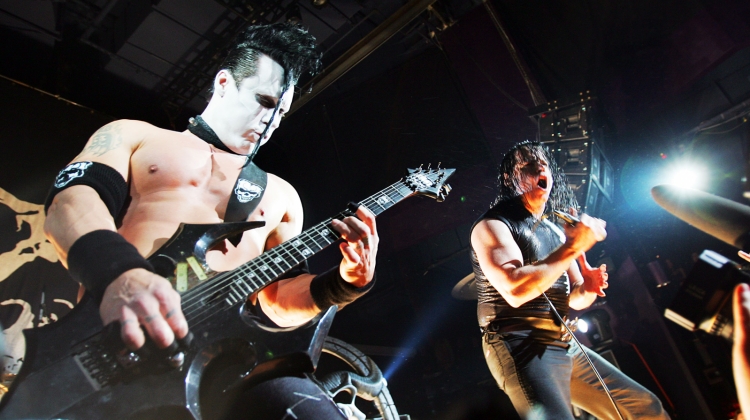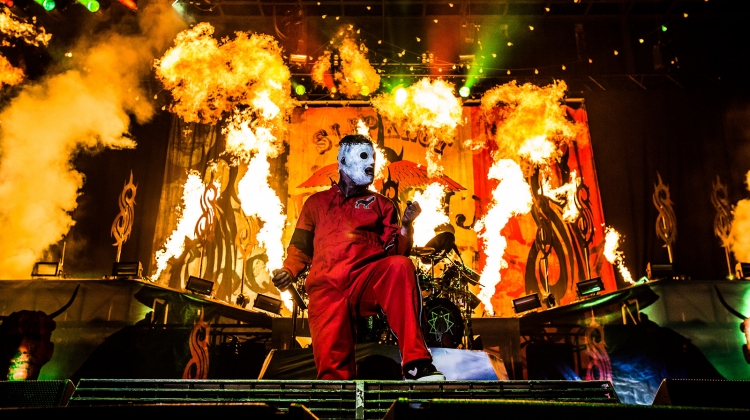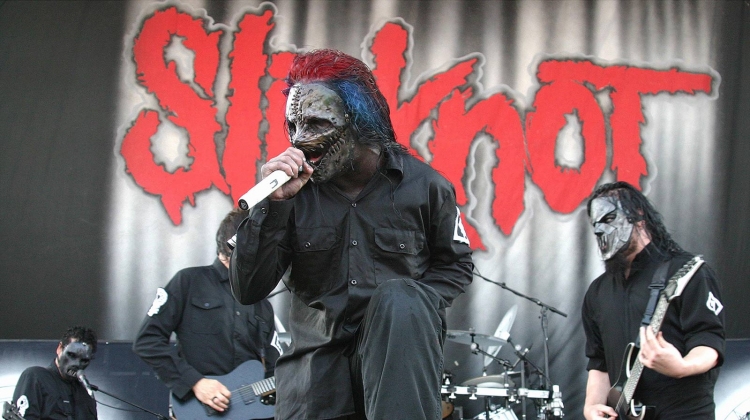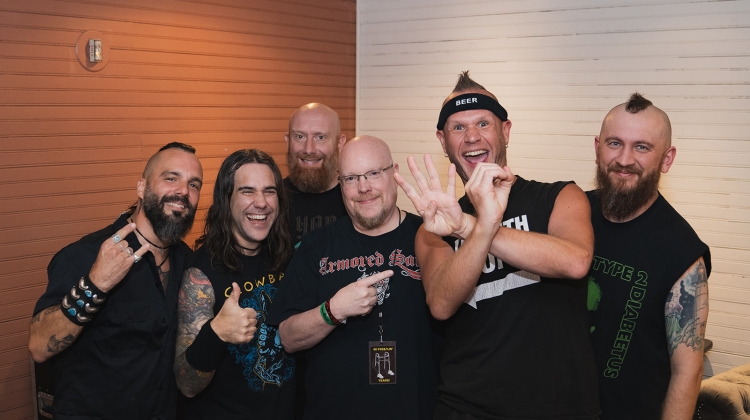As a child, Lzzy Hale's greatest fear was raising her voice. She longed to be invisible, never putting her hand up in class, refusing to even call out for help. During a fire safety lesson at kindergarten, Hale's teacher made the class shout, "Fire! Fire!" so they could practice being heard in case there was a blaze. While the rest of Hale's classroom peers could be heard from down the hall, Hale's voice wouldn't reach beyond a barely audible whimper. Had there been a fire, she would have been singed.
Today, the Halestorm leader's iconic yell is her calling card. It's a powerful elemental force that has made her one of the most popular, recognizable vocalists in modern heavy music. Hearing her now — and watching her hold court on stages across the world — it's almost hard to imagine Hale as a shy and anxiety-ridden little girl growing up in small-town Pennsylvania.
"I struggled with a lot of self-confidence issues. I didn't want to be loud. I just wanted to quietly move through life," she says over a Zoom call, her voice clear and sonorous. Hale is an immediately warming presence, listening to each question intently and frequently letting out a hearty laugh.
Halestorm, which has now been a part of Hale's life far longer than it hasn't, is the ultimate weapon in her self-empowerment arsenal. The band she formed with her brother, drummer Arejay, when they were just kids has not only given Hale her voice, but her livelihood, too. It even brought Hale her partner, Joe Hottinger, the band's longtime guitarist.
Touring has always been Halestorm's M.O. They're known for their packed schedule, often playing upwards of 250 shows annually. Over 20-plus years, they've shared stages with numerous hard-rock and metal giants — from Alice Cooper and Heaven & Hell to Disturbed, Avenged Sevenfold and more. Their records also began making a major dent in the charts around a decade ago, when their 2012 sophomore album The Strange Case Of… peaked at No. 15 on the Billboard 200. The following year, the album's lead single "Love Bites (So Do I)" took home the Grammy for Hard Rock/Metal Performance.
Ever since, the band have established themselves as a mainstay within the heavy-rock world, as well as a firm representative for it: They've consistently provided an accessible gateway into the realm of hard rock for outsiders. This year, Halestorm released their fifth album, Back From the Dead, a record on which they channeled the COVID anxieties they felt during the past two years of quasi-isolation — a time when they were forced to get to know themselves as people rather than as performers. The album continued the band's dominance, with singles reaching the top spots on Billboard's Mainstream Rock Airplay chart.
Hale herself, with her unrivaled vocals, has been tapped for scores of high-profile collabs with everyone from Dream Theater, Stone Sour and Mark Morton to Evanescence, Eric Church and Machine Gun Kelly. Knowing she has the world listening, Hale has also used her voice to champion LGBTQI visibility and mental health awareness. She's a trailblazer for women in rock, too, encouraging young girls to pick up a guitar and follow in her footsteps — something that Gibson recognized when they chose her to become their first female brand ambassador.
This year is the 25th anniversary of Hale and her brother's first show together as Halestorm, and to mark the occasion she sat down with Revolver to take a look back at the key moments of her life that turned her into the woman she longed to be when she was a young child.
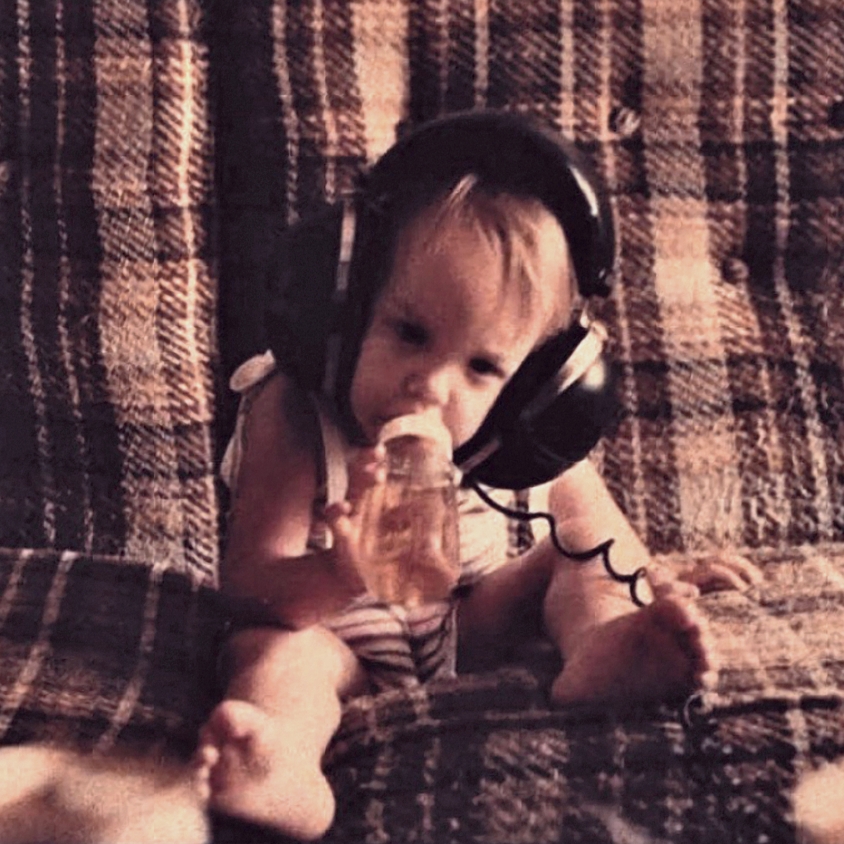
FIRST THINGS FIRST: WHEN AND WHERE WERE YOU BORN?
LZZY HALE I was born just outside of Philadelphia, Pennsylvania, on October 10th, 1983. My parents then decided to move to a log cabin in the woods when I was nine. It was one bedroom, one bathroom, one living room, with no neighbors for 10 miles in any direction, along the Appalachian Trail. I was a farm girl for a second before the music bug really took hold and then we sold off sheep and chickens to buy our first PA system. Our first trailer was the donkey trailer, all our equipment smelled like hay for a long period of time.
I'D IMAGINE THAT GROWING UP ON A FARM ALSO TAUGHT YOU ABOUT THE CIRCLE OF LIFE PRETTY EARLY.
Yeah, I think so. It being right there, in your face. And then also when you got attached ... There was one little lamb who I named Snickers because it had the coloring of a Snickers bar — and I dubbed it mine. My little buddy. He ended up not making it. It's the circle of life. I learned a lot about that through living on a farm.
STEPPING BACK A BIT: DO YOU RECALL YOUR FIRST MEMORY?
I remember quite far back. My earliest memories begin when I was about three. I remember my mom being pregnant with my little brother. She was really sick; my little brother did a number on my mom! [Laughs] I remember when my little brother came home from the hospital. I was comprehending it all, like, OK, now I have this little brother and I have to help take care of him. That's my earliest memory. I tend to remind him of that. Like, "Hey! My life kind of began with you."
DO YOU REMEMBER ANY OF YOUR DREAMS AS A KID?
It's funny because later on, when we first started the band, I started paying more attention to my dreams as they would inspire songs. There was one that we ended up writing a song about called "Time Man." I had a dream I was in an elevator and there was this scary looking bellhop who was trying to put me down and remind me of all the things I didn't like about myself. And this song was kind of like me sticking it to him.
DID TIME MAN EVER COME BACK AFTER YOU WROTE THAT SONG ABOUT HIM?
No, he did not. I shooed him away. We ended up recording it on our first-ever cassette tape as Halestorm, so he made it onto the record. That was the last I ever saw him. It's funny how I've rediscovered that even through writing this last record — writing is a type of therapy. If you can put all of the puzzle pieces together and you write the song, you can set those issues aside. There's a sense of relief.
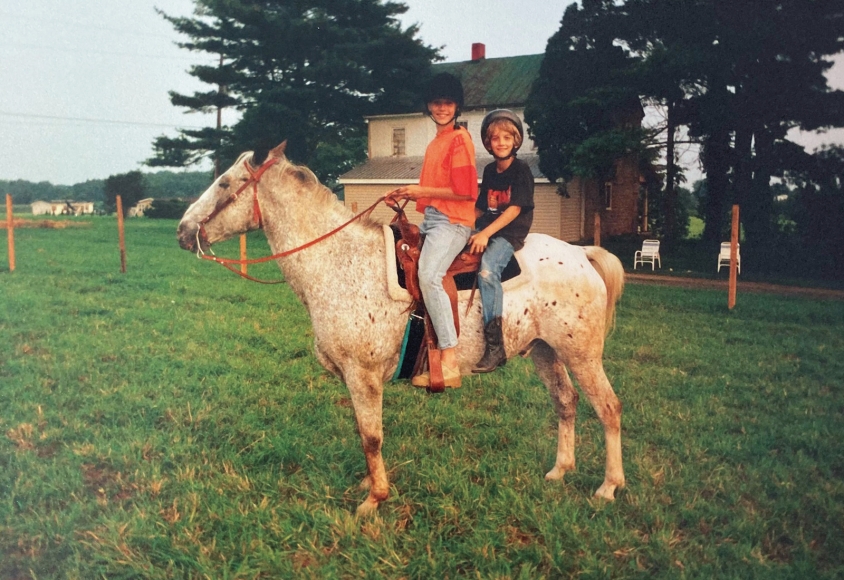
WHEN DID YOU FIRST DISCOVER THE THERAPEUTIC POTENTIAL OF SONG-WRITING?
It was shortly before we started the band. I'd started writing songs, and my dad gave me this four-track recorder. I was always a very shy kid. If we go back in time here — because my mom just reminded me of this story — I was in kindergarten and the teachers were trying to help us learn to yell for the fireman if there was a fire. Apparently, my mom had to be called because I wouldn't yell, which is ironic because I kind of make my living yelling now.
DO YOU REMEMBER THE FIRST TIME YOU WERE TOLD THAT YOU HAD A TALENT?
Yeah, my parents were always really encouraging. I started singing little songs around the time I was about nine. I'd sing in church; I was in choir for a second. I was always good at staying in key. The church director told me I had a voice, though it wasn't what it is now.
Really shortly after that — my brother was always really good on drums — so we started playing together. And then, literally 25 years ago, in the summer of 1997, we decided to have a show outside of our parents' home at a county fair talent show. On the way to the show, my little brother said, "We have to have a band name!" And I said, "OK, what do you want to call it?" And we named it Halestorm.
We went up and did a song that we had written together, a five-minute song called "Love Is Power" with a drum solo in the middle of it. We got the third-place trophy and lost to the tap-dancing cowgirl — who was much cuter than we were. I just found the trophy, actually. It's next to the Grammy, but it's of equal importance.
YOU SAID GROWING UP YOU HAD A DIFFERENT VOICE WHILE SINGING IN THE CHURCH. HOW DID YOU LAND ON THE ONE YOU HAVE NOW? WAS THERE A MOMENT WHEN YOU THOUGHT, OK, NOW THIS IS MY VOICE?
Maybe 15, 16, just playing in the bars. Maybe it was just because I was competing with a lot of loud noise, but I realized that I could push myself further than what I had been doing before. Really, that came with the stage-presence thing too. Around 15, I started doing this experiment ... I wanted to have a presence like the people I grew up listening to, like Pat Benatar, so instead of looking at the audience as a whole lot of people, I would start picking out one person at a time and literally staring them down.
I remember that being such an intense thing for me to do, almost like a staring contest. But usually — because I was the one with the microphone — they would look away first. So that gave me a sense of power, and then I would start pushing the envelope.
I remember there being a small almost tri-tone crack in my voice when it started to get a little more guttural, and I thought, Oooh, that's something different. Also, when I was 16, we had a guitar player who left, and I was like, Agh! Man! We're never gonna find another guitarist. So I thought, You know what, we have gigs coming up, I'm just gonna learn how to play guitar. So I did it almost out of necessity. From there, I started making a loud noise on guitar and then that ended up influencing a little bit more of a harder voice.
WHAT DID THE BAND'S EARLY DAYS LOOK LIKE, YOU KNOW, GOING FROM JUST PLAYING FOR THE HELL OF IT TO SELLING YOURSELF AS AN IDEA TO STRANGERS?
I suppose I was in my late teens when things were really starting to develop. We went to music conferences in Philadelphia. We wanted to learn how to promote CDs and how to cope with touring.
We met Joe and Josh [Smith], our current guitarist and bassist, around this time. And that's when Halestorm really started to become what it is now. I remember, we were showcasing for everybody, Epic Records, Columbia Records, you name it. They all kind of said the same thing: Because I was a girl in hard rock they didn't know what to do with me. This was before Amy Lee broke out and shattered the glass in the hard-rock scene. We stuck it out. Finally, in '05, we ended up signing a deal with Atlantic.
That was an interesting choice, too, because at the time, we were doing about 200-250 gigs a year on our own. We were spiraling out, opening up for some national acts, so we had to make the decision. We could keep doing this on our own and be super DIY, or we could go with the big guns and see what this whole record deal was about. So when they popped the question, we were like, alright, sure.
WHEN DID YOU START RECORDING THAT DEBUT WITH ATLANTIC?
We didn't start recording right away. It was our then-A&R guy's idea — we'd recorded a five-song EP in 2005 [One and Done] — and then we went right out on the road, opened up for Seether and Shinedown and Trapt, all the bands of that time. We stayed on the road for quite a bit and then we finally settled into writing the first [self-titled] album in 2007. We went out to California to talk to producers and that was such a long period of time because that was when the industry was changing. Everyone was trying to figure out how to combat the digital scene.
There were a lot of people being let go, our A&R guy got fired, there were all these peers on our label getting dropped. We were stuck in California at the Oakwoods apartments. The first producer we were talking to dropped out of the project and we just kept writing and writing. From the time we got stranded in California to the time we finished our first album was about 19 months. There was a mudslide, there was a fire, two earthquakes; the whole thing was a mess. Then we finally debuted it in 2009.
YOUR SECOND ALBUM, 2012'S THE STRANGE CASE OF… EARNED YOU A GRAM-MY. WAS THAT A SURPRISE? DID YOU KNOW THAT YOU WERE EVEN ON THE RECORDING ACADEMY'S RADAR?
Not at all. It was quite a shock. We were in Madison, Wisconsin, playing a show. I sat down at my piano to do a couple songs by myself. Our sound guy had texted my guitar player's tech to say, "Hey, you guys were just nominated for a Grammy." My guitar player on the side-stage was like, "What?!" He had to look it up on his phone. Before I even started one of my piano songs, Joe ran out and yelled in my ear, "Dude! We were nominated for a Grammy!"
And I must have had this look on my face like somebody died because the audience was like, What? What happened?! And I just turned to the audience and was like, "Guys … I guess we were just nominated for a Grammy." And the place just erupted.
We saw who we were up against: all of our idols and heavy hitters. I literally sat down and had a very adult conversation with the boys, like, "Guys, let's not get our hopes up about the Grammys. We're definitely not gonna win it, but we're gonna go. We've gotten invited to a bunch of these parties where we definitely don't belong. We can just celebrate the accomplishment of being nominated."
Then the time comes when we're sitting there, our category comes up, and they say, "The Grammy goes to…" We were listening for Halestorm because we didn't realize they said the song title first, so we heard the L of "Love Bites (So Do I)" and thought, Oh, well it wasn't us. And then we were like, Oh, wait! That was us! [Laughs]
DID YOU GET TO MEET ANY OF YOUR IDOLS AT THOSE AFTER-PARTIES?
We met a lot of people who weren't necessarily our heroes but who were definitely out of our league. There were a couple parties where Sting was hanging out, and like, Katy Perry and John Mayer and Quincy Jones. After a couple glasses of wine, I did go over and introduce myself to Katy Perry because my mindset was like, You know what? She's not going to remember me. So, I went up — I think a little too aggressively [Laughs] — and was like, "Hey! My name's Lzzy Hale. I'm in a band called Halestorm. We just won our first Grammy. I just wanted to say hi." She just looked at me — smoking a cigarette, letting out a puff of smoke — and said, "Alright."
We also got to have a conversation with Quincy Jones, and he was really sweet. He didn't brush us off. He was like, "Oh, that's amazing. You have to stick it out. You have to keep doing this." It was such a fun time because everything on that level was super new, and since then I've gotten to do so many different events at the Grammys. We got nominated again for our last album cycle [2018's Vicious], and they let me host for a category. So I got to give away some Grammys. It's just interesting how now that's like a part of my life, being a part of the Recording Academy. But at the time I didn't even know they knew who I was.
I THINK IT WAS IN 2015 WHEN YOU FIRST TOLD YOUR FANS YOU WERE BISEXUAL, RIGHT? HAD YOU BEEN HAVING THAT CONVERSATION WITH YOURSELF FOR A WHILE?
I was having that conversation in my head since I was a teenager. It's funny, I had such a Rob Halford moment, like when he came out as gay during an interview kind of by accident. I had gotten to a moment in my life through writing songs and being in this band that I was definitely more confident being unapologetic about who I am — and who I am inside. And then I remember somebody asking, "So, how do you identify?" And I replied, "Well, actually…" And I just said it. My bandmates knew, my parents knew, but I think that was really the first time I was directly asked. I was just honest about it. And the beautiful thing about being honest about who you are is that I got a lot of people from the community saying, "Oh, that's amazing. Now I have somebody I can see myself in." That's been a huge gift.
There's a song on our new album called "Strange Girl" that was directly inspired by a conversation with a young 15-year-old who had just come out as gay right before lockdown. She was stuck with her parents the whole time [and they] were not having it. So I had this conversation with her and said, "Hey, I'm in your boat." I took that conversation into one of our writing sessions, and wrote her an anthem that she could wake up to every morning and think, Right, not only am I confident in myself, but I also have this buddy. She has me. She's not alone.
AS YOU GROW OLDER, DO YOU FEEL YOU'RE GETTING CLOSER TO YOUR CORE SELF, OR MAYBE WHO YOU ASPIRED TO BECOME AS A CHILD?
I think so. If my 13-year-old self could see me now — I think I am the person she wanted to be. Through this band and all of the challenges I've faced and all the different lifetimes I've had to live through to get here — yeah, I think that I was always striving to be the person I am now. I've realized the importance of keeping that inner child as my north star, because if you lose that you lose the whole reason that you're in this. So, I think the further on I go, the closer I get to her.
